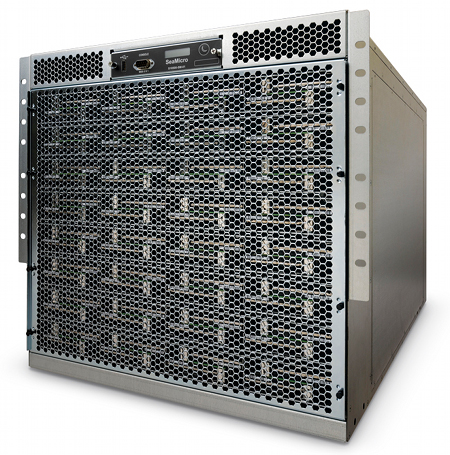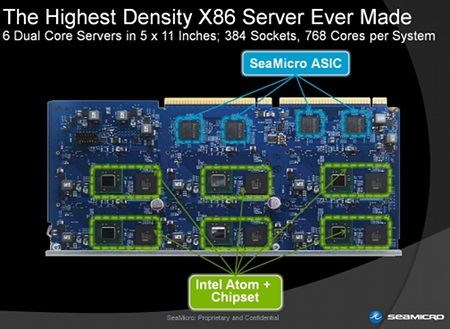‘Low-power’ server packs 384 dual-core Atoms
Jul 18, 2011 — by LinuxDevices Staff — from the LinuxDevices Archive — viewsSeaMicro says it has packed more Intel Atom processors into a new device it claims is the most power-efficient x86 server on the market. The SM10000-64HD has 384 N570 chips, 1.5 terabytes of DDR3 memory, up to 64 SATA hard disks or solid state drives, and from eight to 64 gigabit Ethernet ports, the company says.
SeaMicro officials on July 18 unveiled the SM10000-64 HD, a server that packs 768 Atom processor cores. The device improves compute density by 150 percent and per-watt performance by 20 percent, according to SeaMicro founder and CEO Andrew Feldman.
Feldman noted the rapid innovation his company is offering in its high-density, low-power servers. "This a rate of change that is absolutely unheard of in the server market," he said in an interview with our sister publication eWEEK.
SeaMicro is building its servers to process simple Web transactions, which don't need all the performance of mainstream Intel Xeon or Advanced Micro Devices Opteron processors. The systems are aimed at Internet businesses — including Skype, Mozilla, Rogers Wireless and eHarmony — that cram their data centers with huge numbers of low-power servers, driving the need for energy efficiency, high density and low costs.
"We set out to solve the data center's most important problems of power and space," Feldman said.

Sea Micro's SM10000-64 HD
(Click to enlarge)
SeaMicro officials opted for Intel's Atom chips for their systems, a move they say has enabled them to create servers that use a fraction of the power and space as today's mainstream systems. The SM10000-64 HD can replace up to 60 1U (1.75-inch) dual-socket server with dual-core chips, while using a quarter of the power and a sixth of the space. Feldman also said the SeaMicro servers also can cut TCO by as much as 80 percent.
Using the Atom chip also means that enterprises can run standard software for x86 systems, with no modifications needed. That was a key consideration for a new vendor looking to compete with the likes of Hewlett-Packard and Dell, Feldman said.
"When you're a startup, the last thing you want to do is show up with new hardware and tell a company that might be interested that 'you need to recompile your software,'" he said.
Feldman said the demand for improved power and space efficiency came because mainstream servers did not keep up with the changing workloads of the Internet, workloads that Feldman described as "bursty," or capable of quickly rising or falling.
SeaMicro solved that problem by finding a highly efficient, low-power chip — the Atom — and reducing the components around the chip, he said. SeaMicro has pared away many of the components, requiring an area essentially the size of a credit card for each Atom chip, SeaMicro's ASIC and DRAM.

The SeaMicro SM10000-64 HD includes 64 compute cards, each with six Atoms
(Click to enlarge)
Multiple 11 x 5-inch compute cards are connected via a SeaMicro fabric. The SM10000-64 HD contains 64 cards, as did the earlier SM10000-64, but each now holds six Atom N570 chips instead of the previous four, bringing the total number of processing cores to 768.
Feldman said that in a server, the chip accounts for only about a third of the power consumption of a system, with the other components making up the rest. SeaMicro's virtualization technologies enabled it to remove 90 percent of the components, he added.
The SM10000-64 HD offers 1.5 terabytes of DDR3 memory, up to 64 SATA hard disks or solid-state drives, and one to eight 64 gigabit Ethernet uplinks, Sea Micro says.
Further information
According to Sea Micro, the SM10000-64 HD systems are available now, starting at $237,000. More information may be found on the SM10000 product page. Jeffrey Burt is a writer for eWEEK.
This article was originally published on LinuxDevices.com and has been donated to the open source community by QuinStreet Inc. Please visit LinuxToday.com for up-to-date news and articles about Linux and open source.